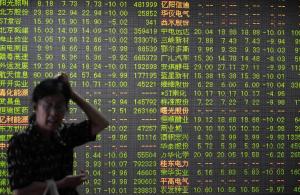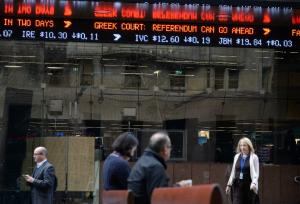China's securities regulator said there was "panic
sentiment" in mainland stock markets on Wednesday, acknowledging the
recent increase in irrational selling, Reuters reported.
Shortly after, the People's Bank of China said it will closely watch stock market direction and guard against systematic regional financial risks.
The comments did little to soothe investor worries about tumbling mainland equities, with the Shanghai Composite sinking more than 8 percent in early trade on Wednesday.
Meanwhile, more than 500 China-listed companies announced trading halts in Shanghai and Shenzhen on Wednesday, Reuters reported, citing an analysis of corporate statements.
More measures were also unveiled on Wednesday to shore up confidence in a stock market that has slumped 30 percent over the past month.
China's securities regulator stated that China Securities Finance Corporation (CSFC), a provider of margin financing loan services, would provide adequate liquidity for brokerages. Meanwhile, the country's insurance regulator said that qualified insurers may increase their ratio of equity assets to 40 percent, from 30 percent previously, by buying blue-chip stocks.
Officials also said on Wednesday that the China Financial Futures Exchange (CFFE) will closely monitor market conditions in CSI500 index to control risks. The CFFE will also raise the deposit ratio and margin requirements for short positions on CSI500 index futures. On Monday, the CFFE announced it would be limiting daily trading on CSI 500 index futures.
State-owned news media outlet Xinhua added that the CFFE would also step up purchases of medium and small cap shares.
Asian equities tumbled Wednesday as a collapse in Chinese
shares began to contaminate other markets, and after European leaders
slapped Greece with a deadline to submit fresh bailout reform proposals.
Most other regional markets were also hit by the spillover effects, with many hosting companies with links to China.
Tokyo sank 3.14 percent, or 638.95 points, to 19,737.64, Seoul slipped 1.18 percent, or 24.08 points, to 2,016.21 and Sydney retreated 2.01 percent or 111.9 points to 5,469.5.
Taipei shed 2.96 percent, or 274.05 points, to close at 8,976.11.
"China's stock market rout is now spreading to other financial markets, creating a sweeping sense of panic and liquidity crunch," said Zheng Ge, an analyst at Wanda Futures Co.
Shanghai is down more than 30 percent from its closing peak on June 12, when it had risen by more than 150 percent in 12 months in a borrowing-fuelled frenzy enhanced by hopes for economy-boosting government measures.
However, analysts said new restrictions on margin trading and concerns about the overvaluation of many stocks have forced mainland investors -- mostly individual retail traders -- to cash out.
There are now fears that the hammering to stock markets will hit the wider Chinese economy, the world's second biggest, which is already struggling with slowing growth.
Wednesday's falls came despite the government announcing new measures to support the market, while Bloomberg News reported that the recent slump has led at least 1,249 companies to halt trading in the mainland, accounting for 43 percent of total listings.
Alex Wong, Hong Kong-based asset-management director at Ample Capital, added: "Gradually this will drag other markets lower because the magnitude of a China crisis would be far bigger than anything happening in Greece."
- 'Grexit scenario prepared' -
In Hong Kong the Hang Seng China Enterprises Index -- which tracks Chinese firms listed in the city -- slumped 5.25 percent.
"The main reason the Hong Kong market is going down is because these two markets (Shanghai and Hong Kong) have high correlation, with many mainland companies listed in both," said financial analyst Castor Pang.
US-listed Chinese stocks -- including Alibaba and Baidu -- took a hit as the shockwaves of the rout in Shanghai reverberated globally.
However, on Wall Street the Dow added 0.55 percent, the S&P 500 jumped 0.62 percent and the Nasdaq rose 0.11 percent.
On currency markets the dollar fell to 122.02 yen against 122.55 yen, with the Japanese unit considered a safe bet.
The euro fell to $1.0991 from $1.1007 in New York, although it is up slightly from a five-week low of $1.0916 it touched in US trade. The single currency was also at 134.30 yen against 134.89 yen.
In Europe, Greece moved closer to an exit from the eurozone after leaders ordered it to submit detailed bailout reform proposals by Thursday, while warning they had drawn up contingency plans in case it does not meet expectations.
All 28 European Union leaders will then examine the plans on Sunday in a make-or-break summit that will either save Greece's moribund economy or leave it to its fate.
"Tonight I have to say loud and clear -- the final deadline ends this week," EU President Donald Tusk told a news conference.
Shortly after, the People's Bank of China said it will closely watch stock market direction and guard against systematic regional financial risks.
The comments did little to soothe investor worries about tumbling mainland equities, with the Shanghai Composite sinking more than 8 percent in early trade on Wednesday.
Meanwhile, more than 500 China-listed companies announced trading halts in Shanghai and Shenzhen on Wednesday, Reuters reported, citing an analysis of corporate statements.
More measures were also unveiled on Wednesday to shore up confidence in a stock market that has slumped 30 percent over the past month.
China's securities regulator stated that China Securities Finance Corporation (CSFC), a provider of margin financing loan services, would provide adequate liquidity for brokerages. Meanwhile, the country's insurance regulator said that qualified insurers may increase their ratio of equity assets to 40 percent, from 30 percent previously, by buying blue-chip stocks.
Officials also said on Wednesday that the China Financial Futures Exchange (CFFE) will closely monitor market conditions in CSI500 index to control risks. The CFFE will also raise the deposit ratio and margin requirements for short positions on CSI500 index futures. On Monday, the CFFE announced it would be limiting daily trading on CSI 500 index futures.
State-owned news media outlet Xinhua added that the CFFE would also step up purchases of medium and small cap shares.
Asia stocks sink as China sell-off spreads
With markets
buffeted by two global crises, traders ran for the cover of investments
considered safe in times of upheaval such as the yen.
Shanghai
closed down 5.90 percent and Hong Kong stocks slumped 7.35 percent in
afternoon trade, despite Chinese leaders announcing fresh measures to
staunch a correction that has wiped trillions off the country's markets.Most other regional markets were also hit by the spillover effects, with many hosting companies with links to China.
Tokyo sank 3.14 percent, or 638.95 points, to 19,737.64, Seoul slipped 1.18 percent, or 24.08 points, to 2,016.21 and Sydney retreated 2.01 percent or 111.9 points to 5,469.5.
Taipei shed 2.96 percent, or 274.05 points, to close at 8,976.11.
"China's stock market rout is now spreading to other financial markets, creating a sweeping sense of panic and liquidity crunch," said Zheng Ge, an analyst at Wanda Futures Co.
Shanghai is down more than 30 percent from its closing peak on June 12, when it had risen by more than 150 percent in 12 months in a borrowing-fuelled frenzy enhanced by hopes for economy-boosting government measures.
However, analysts said new restrictions on margin trading and concerns about the overvaluation of many stocks have forced mainland investors -- mostly individual retail traders -- to cash out.
There are now fears that the hammering to stock markets will hit the wider Chinese economy, the world's second biggest, which is already struggling with slowing growth.
Wednesday's falls came despite the government announcing new measures to support the market, while Bloomberg News reported that the recent slump has led at least 1,249 companies to halt trading in the mainland, accounting for 43 percent of total listings.
Alex Wong, Hong Kong-based asset-management director at Ample Capital, added: "Gradually this will drag other markets lower because the magnitude of a China crisis would be far bigger than anything happening in Greece."
- 'Grexit scenario prepared' -
In Hong Kong the Hang Seng China Enterprises Index -- which tracks Chinese firms listed in the city -- slumped 5.25 percent.
"The main reason the Hong Kong market is going down is because these two markets (Shanghai and Hong Kong) have high correlation, with many mainland companies listed in both," said financial analyst Castor Pang.
US-listed Chinese stocks -- including Alibaba and Baidu -- took a hit as the shockwaves of the rout in Shanghai reverberated globally.
However, on Wall Street the Dow added 0.55 percent, the S&P 500 jumped 0.62 percent and the Nasdaq rose 0.11 percent.
On currency markets the dollar fell to 122.02 yen against 122.55 yen, with the Japanese unit considered a safe bet.
The euro fell to $1.0991 from $1.1007 in New York, although it is up slightly from a five-week low of $1.0916 it touched in US trade. The single currency was also at 134.30 yen against 134.89 yen.
In Europe, Greece moved closer to an exit from the eurozone after leaders ordered it to submit detailed bailout reform proposals by Thursday, while warning they had drawn up contingency plans in case it does not meet expectations.
All 28 European Union leaders will then examine the plans on Sunday in a make-or-break summit that will either save Greece's moribund economy or leave it to its fate.
"Tonight I have to say loud and clear -- the final deadline ends this week," EU President Donald Tusk told a news conference.
"Inability to find an agreement may lead to bankruptcy of Greece and insolvency of its banking system," he added.
European
Commission President Jean-Claude Juncker warned "we have a Grexit
scenario prepared in detail", although he insisted he wanted Athens to
stay.
The move turns the heat
up on Greek Prime Minister Alexis Tsipras after the country voted Sunday
against another round of painful austerity they say has crippled the
economy.
On oil markets US
benchmark West Texas Intermediate for August delivery dropped 14 cents
to $52.19 a barrel and Brent tumbled 13 cents to $56.72, both reversing
an earlier uptick.
Gold fetched $1,152.80 compared with $1,165.74 late Tuesday.





No comments:
Post a Comment